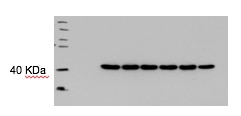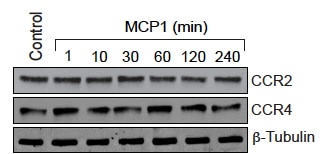Mouse CCR4 Antibody Summary
Met1-Glu39, Ala99-Lys111, Ser176-Ile205, Val268-Tyr284
Accession # P51680
*Small pack size (-SP) is supplied either lyophilized or as a 0.2 µm filtered solution in PBS.
Applications
Please Note: Optimal dilutions should be determined by each laboratory for each application. General Protocols are available in the Technical Information section on our website.
Scientific Data
 View Larger
View Larger
Detection of Mouse CCR4 by Western Blot. Western Blot shows lysates of EL‑4 mouse lymphoblast cell line. PVDF membrane was probed with 1 µg/ml of Sheep Anti-Mouse CCR4 Antigen Affinity-purified Polyclonal Antibody (Catalog # AF5207) followed by HRP-conjugated Anti-Sheep IgG Secondary Antibody (Catalog # HAF016). A specific band was detected for CCR4 at approximately 42 kDa (as indicated). This experiment was conducted under reducing conditions and using Western Blot Buffer Group 8.
Reconstitution Calculator
Preparation and Storage
- 12 months from date of receipt, -20 to -70 °C as supplied.
- 1 month, 2 to 8 °C under sterile conditions after reconstitution.
- 6 months, -20 to -70 °C under sterile conditions after reconstitution.
Background: CCR4
CCR4 (C-C chemokine receptor 4) is a 42 kDa member of the GPCR #1 family of transmembrane proteins. In rodent, functional CCR4 is expressed on fully differentiated CD4+ Th2 cells, invariant CD4+ NKT cells, and neurons. It is the receptor for CCL17/TARC, CCL22/MDC and CKLF1, and responds to these ligands by initiating chemotaxis. Mouse CCR4 is a 7-transmembrane protein that is 360 amino acids (aa) in length. It contains a 39 aa N-terminal extracellular domain, and a 52 aa C-terminal cyoplasmic tail that shows a poly-Ser motif between aa 343-346. Over aa sequences 1-39, 99-111, 176-205 and 268-284 collectively, mouse CCR4 shares 85% and 93% aa identity with human and rat CCR4, respectively.
Product Datasheets
Citations for Mouse CCR4 Antibody
R&D Systems personnel manually curate a database that contains references using R&D Systems products. The data collected includes not only links to publications in PubMed, but also provides information about sample types, species, and experimental conditions.
2
Citations: Showing 1 - 2
Filter your results:
Filter by:
-
Endogenous expression of matriptase in neural progenitor cells promotes cell migration and neuron differentiation.
Authors: Fang JD, Chou HC, Tung HH
J. Biol. Chem., 2010-12-13;286(7):5667-79.
Species: Mouse
Sample Types: Whole Cells
Applications: ICC -
PLC3 mediates cortactin interaction with WAVE2 in MCP1-induced actin polymerization and cell migration.
Authors: Jagadeesh Janjanam, Giri Kumar Chandaka, Sivareddy Kotla et al.
The American Society of Cell Biology
FAQs
No product specific FAQs exist for this product, however you may
View all Antibody FAQsReviews for Mouse CCR4 Antibody
Average Rating: 4 (Based on 3 Reviews)
Have you used Mouse CCR4 Antibody?
Submit a review and receive an Amazon gift card.
$25/€18/£15/$25CAN/¥75 Yuan/¥2500 Yen for a review with an image
$10/€7/£6/$10 CAD/¥70 Yuan/¥1110 Yen for a review without an image
Filter by:




